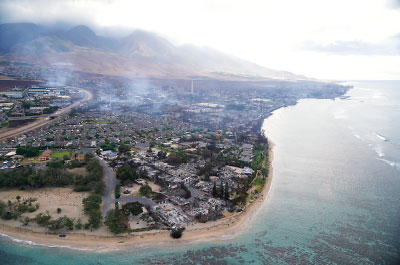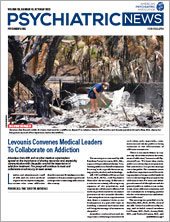Disaster psychiatrist Dr. Frank Sommers has said that all psychiatrists should consider themselves disaster psychiatrists (
Psychiatric News, “
My Journey Into Disaster Psychiatry: Join Me”). Disasters are occurring with increasing frequency and intensity, often colliding with each other. None of us know when one may affect us personally.
Disasters have changed my life. As a New York City native, I have been involved in disaster psychiatry since September 11, 2001. I began attending APA’s Committee on the Psychiatric Dimensions of Disaster meetings and am now a member. I have joined multiple disaster organizations and am the mental health lead for the Maui branch of the Honolulu Chapter of the American Red Cross. I am also the disaster representative of APA’s Hawai’i district branch. As an Assembly representative, I have recruited disaster representatives for Area 7 and 13 district branches in western states and western Canada.
Eighteen years after I became active in disaster psychiatry, the COVID-19 pandemic made me more careful, preventing me from traveling for four years. I did what I could through the Medical Reserve Corps, and I wound up jabbing folks with the first COVID-19 vaccines on Maui in the parking lot of the local community college. Two years later, I had cancer, which made me live more in the present and be grateful for all my blessings all day, every day. Thankfully, I am one year out from treatment, and I passed my last cancer check. Now, we have the three Maui wildfires and the prospect of rebuilding.
My husband and I have lived on Maui for more than 30 years. The upcountry fire is above our house. The first night of the fire, we could see flames leaping high into the air on the island’s isthmus from the Pulehu fire. The Lahaina fire, on the western side of the island, was the worst. Thousands have been displaced, more than 800 are missing, at least 115 have died, and the remains of only 35 victims were identified as of this writing in late August.
Since the wildfires began, my husband and I have been safe. Nevertheless, neighbors who live just 10 minutes away are dealing with wind, fire, and smoke. They also lack power, internet connection, and access to clean water. As I offer support to my neighbors and my community, I have been working hard to keep myself calm and take care of myself. I have been connecting with friends, relatives, and colleagues. I advanced both self and community efficacy by sheltering friends in our home, then disseminating resources and mentoring Hawai’i psychiatrists by telephone and on the ground in shelters.
Disaster mental health services are different from traditional mental health services. Some Maui mental health clinicians did not understand that at first, so I gave a talk on Psychological First Aid (PFA), which was well attended and well received and appears to have brought the Maui mental health community together again. This gives me a sense of hope during this extremely difficult time.
The five words and phrases in italic above are the five basic elements of PFA. Everything we do in disaster psychiatry involves one or more of these elements. I suggest all psychiatrists familiarize themselves with actions that foster the five essential elements of PFA through the many courses and apps that are readily available.
For those interested in becoming involved in disaster psychiatry, there are numerous resources available. A new, interactive online training on
Disaster and Preventive Psychiatry is free to members (CME included) and the public. APA’s website has a disaster resource page with
information for psychiatrists, as well as an education page you can provide to
your patients. APA also has a disaster mental health community that psychiatrists who are interested in disasters can join by accessing the communities section on their APA profile page.
Additionally, there is a dedicated APA community for disaster representatives, which is an official position in each of APA’s district branches and is listed in APA’s component directory. Currently, one-third of district branches have a disaster representative, though all district branches need psychiatrists to volunteer for this important work. District branches can have multiple disaster representatives, and I encourage you to nominate yourself to your district branch president if you’re interested in supporting your community, colleagues, and/or patients during disasters.
I am very busy and stressed, but I have the help and support of members of APA’s Committee on the Psychiatric Dimensions of Disaster and others. I would like to thank the committee members and all disaster relief workers on Maui. We are all doing what we can, and you can too. Donations can also be made at hawaiicommunityfoundation.org. ■


